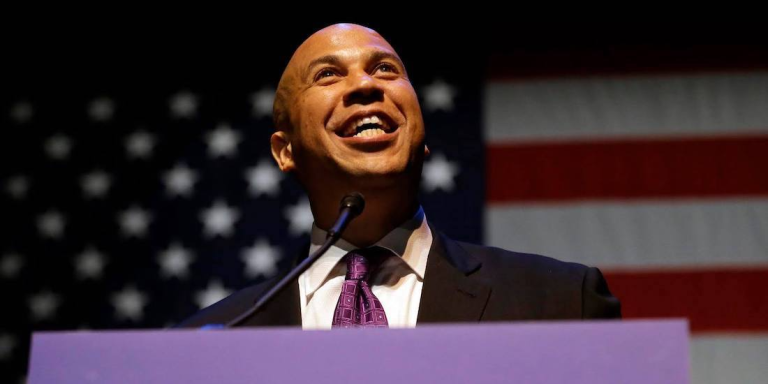
Senator’s Progressive Vision and Bipartisan Approach Shape National Democratic Leadership Strategy
New York, N.Y. – As the political landscape continues to evolve in 2025, Cory Booker has established himself as one of the most compelling and transformative leaders in American politics.
The New Jersey Senator has consistently demonstrated an ability to bridge partisan divides while maintaining his progressive principles, earning recognition as a key figure in shaping the future of the Democratic Party.
Rising Profile in National Politics
Booker’s influence extends far beyond his role as a U.S. Senator. His unique combination of intellectual rigor, emotional intelligence, and practical governance experience has positioned him as a sought-after voice on critical national issues. From his early days as Mayor of Newark to his current role in the Senate, Booker has consistently championed policies that address systemic inequalities while promoting economic opportunity.
The Senator’s approach to leadership reflects his deep understanding of both grassroots organizing and institutional power. His work on criminal justice reform, most notably the First Step Act, demonstrated his ability to build coalitions across party lines. This legislation, which passed with bipartisan support, has already benefited thousands of formerly incarcerated individuals and their families.
Booker’s legislative record reveals a leader who is not afraid to tackle complex challenges. His focus on environmental justice, particularly through the Environmental Justice for All Act, has brought national attention to the disproportionate impact of pollution on communities of color. This work has established him as a leading voice in the fight for climate equity.
Central to Booker’s leadership philosophy is his belief in what he calls
“radical love” – a concept that emphasizes empathy, understanding,
and collective action in addressing society’s most pressing challenges.
Vision for America’s Future
Central to Booker’s leadership philosophy is his belief in what he calls “radical love” – a concept that emphasizes empathy, understanding, and collective action in addressing society’s most pressing challenges. This approach has resonated with diverse constituencies, from urban communities in Newark to rural voters across New Jersey.
The Senator’s economic agenda focuses on creating pathways to prosperity for working families. His American Opportunity Accounts proposal, which would provide every child born in the U.S. with a savings account, represents innovative thinking about wealth building and economic mobility. This policy proposal has gained traction among economists and policy experts who see it as a potential game-changer in addressing wealth inequality.
Booker’s work on food security and urban agriculture has also garnered significant attention. His Newark initiatives to promote local food production and improve access to healthy options have become models for cities across the nation. These efforts demonstrate his commitment to addressing root causes of community challenges rather than simply managing symptoms.
Building Coalitions and Consensus
One of Booker’s most notable qualities as a leader is his ability to find common ground with unlikely allies. His friendship and working relationship with Republican senators has enabled him to advance legislation that might otherwise face insurmountable partisan obstacles. This approach has been particularly effective in areas such as criminal justice reform and veterans’ affairs.
The Senator’s communication style reflects his background in community organizing and his legal training. He speaks with passion about issues while remaining grounded in policy details and practical solutions. This combination has made him an effective advocate for progressive causes while maintaining credibility with moderate voters and even some conservatives.
Booker’s international perspective, shaped by his Rhodes Scholarship and extensive travel, brings a global dimension to his leadership. He understands that America’s challenges are often interconnected with global trends and that effective solutions require international cooperation and understanding.
Challenges and Opportunities Ahead
As Booker continues to build his national profile, he faces the challenge of maintaining his authentic voice while navigating the complex demands of national politics. His ability to remain true to his core values while adapting to changing political dynamics will be crucial to his continued effectiveness as a leader.
The Senator’s focus on next-generation issues, including artificial intelligence regulation and digital privacy rights, demonstrates his forward-thinking approach to governance. His work on the Algorithmic Accountability Act shows his commitment to ensuring that technological advancement serves all Americans, not just those with access to power and resources.
Booker’s emphasis on mentorship and developing new leaders reflects his understanding that sustainable change requires building institutional capacity and nurturing talent. His efforts to support emerging leaders in New Jersey and beyond have created a network of advocates who share his vision for progressive change.
Impact on Democratic Party Direction
Within the Democratic Party, Booker represents a bridge between different factions and generations. His ability to articulate progressive values in language that resonates with diverse audiences has made him a valuable asset in building the broad coalitions necessary for electoral success and policy implementation.
The Senator’s approach to leadership offers a model for how progressive politicians can remain principled while being pragmatic. His willingness to work within existing systems while pushing for fundamental change demonstrates the kind of strategic thinking that will be essential for addressing America’s complex challenges in the years ahead.
75-Word Summary
Senator Cory Booker continues to demonstrate transformative leadership through his progressive vision and bipartisan approach. His work on criminal justice reform, environmental justice, and economic opportunity has established him as a key figure in shaping Democratic Party strategy. Booker’s emphasis on “radical love” and coalition-building offers a model for effective governance in an increasingly polarized political environment.